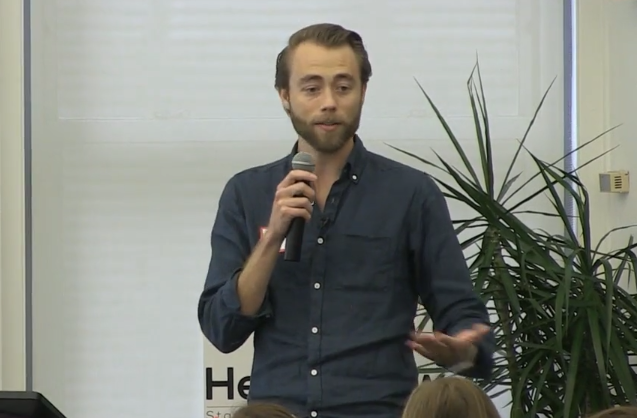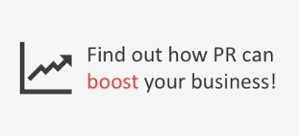How We Turned a Cease-and-Desist Letter into PR Gold

Kyle Welter is the Director of Marketing at Tock, an elite restaurant reservations and culinary experience platform.
Read on for a transcript of his presentation from our September 19, 2017, Here’s How Startup Marketing Conference, where he describes how he turned a cease-and-desist letter into PR gold.
My name is Kyle Welter and I run marketing at Tock. We're a team of 35 people over in the West Loop who are deeply passionate about culinary experiences and really great software. At our core, we're a platform that powers table and reservation management to help restaurants around the world highlight what makes them truly unique.
We segment our core prospects into three buckets: new, unique, great. “New” meaning the new restaurants that are usually hot and full all the time, “unique” meaning maybe they have a Chef's Con or something that makes them a little bit more special than just this exchange of cash for sustenance, and “great” meaning some of the best restaurants around the world, ones where their platform was built very specifically to help them offer a very unique touch of hospitality. That's why we partner with a lot of these restaurants.
As far as where we are as a business, we raised Series A funding in October and we've processed over $210 million worth of prepaid reservations. We came to the market with something a little bit different. In every other form of entertainment, whether it's a concert, a theater or even going to a movie theater, the person that's attending wants the exchange of money upfront, meaning when they pay for the ticket they also reserve their seat.
That hasn't made it over into the restaurant world, or hadn't until we started doing it. What we see happening for a lot of great restaurants is that people make reservations months out and then something happens or it rains and 30% of them no-show. And in an industry where profit margins average around 10% and there’s an average no-show rate of 10%, that's why so many great restaurants close.
So our CEO was launching Next, a restaurant over in West Loop, and he's like, "This is crazy. We have high demand. People they say they want to show up and then we leave a table empty and the vibe of the restaurant is hurt." So we put together a very crude ticketing system and it worked. Then restaurants around the world started saying, "Hey, we want this." That's where the product came from.
So the situation that we're in as a business is that there's an incumbent, OpenTable. OpenTable is by far and away the majority leader. Most people go there for reservations. They were built in 1998 so they really have a strong hold on the industry and what restaurants don't always realize is that there are better options out there. They just say, "It's what everybody uses so it's what we should be on."
The challenge is: How do you get restaurants to question that status quo?
Now there are always people on the cutting edge and they're the early adopters. We have them, so now we need to bridge the chasm to the people who aren't those early adopters and we need to educate them on why there's a better way.
One of our messaging strategies is getting restaurants to question the viability of OpenTable. We like to position them as this antiquated piece of technology from 1998 that basically brought a reservation book online, then we position ourselves as the future with the unique tools that actually help them run a great business.
So I'll walk you through a story as to how this happened earlier in the year.
1. We had a Friday afternoon Pinot and bought a URL
It was a Friday afternoon and we were popping a bottle of Pinot and getting away from the computer as we always do – I highly recommend it. We were talking about how antiquated OpenTable was and we were just riffing and having fun when somebody put the word out: OpenTableSaurus. We were laughing about it and then we looked up the URL, it was available and we just bought it. It was $12. We have a ton of URLs that we just buy for fun in case we ever want to do anything.
2. We planned our National Restaurant Association show presence in an untraditional way – with dinosaurs.
The National Restaurant Association show was coming up and we had just bought the OpenTableSaurus link. Many months later, the NRA arrived in town here. They find food, kitchen equipment, etc., and so they'd invited us to have a booth. We started thinking about it and we just didn't think it was the best use of our time or money. If you want to outfit a booth, it's going to cost $30,000 and we figured there had to be a smarter way to go about it.
Instead we thought, "You know, we have that OpenTableSaurus link, maybe we can use that.” There was a really great thing that WePay did a while back with PayPal when PayPal was notorious for freezing up accounts and then people couldn't get their money out. So WePay froze a 600-pound block at the annual PayPal Developers Conference with money and it said, "Unfreeze your accounts." It was really funny. I thought it was great, and our CEO Nick was like, "You know, why don't we just get a bunch of dinosaurs?" He remembered OpenTableSaurus and he goes, "Hey, what's a better animal to embody this old, lumbering piece of technology than a brontosaurus?" First of all, that dinosaur didn't even technically exist. Second, it's 17 tons and had a proverbial brain the size of a walnut, so it's pretty dumb.
So we said we’ll just pass out these dinosaurs because everybody loves them, and even if they don't want them they'll give them to their kids. It'll have the URL on it and maybe we'll have a fun little animation on it. It'll just get people talking. It's a lot better than standing at a booth and talking to people who probably aren't qualified leads anyway.
We thought it was funny and then we went on Alibaba and we lined up a bunch of these dinosaurs we were going to get them printed on. We even ordered a 33-foot tall dinosaur that we were going to blow up and put out there. Our goal was to get people talking and we wanted to have fun with it.
Then, about a month later, we got a cease-and-desist letter from OpenTable's lawyers because they have some sort of trademark tracking software. They said, "Immediately take down this URL, transfer it to us. It's a trademark violation. People are going go to OpenTableSaurus.com and think that they're getting OpenTable and have been deceived, then go to your product."
3. We used a cease and desist as a way to position us as the David vs. Goliath.
So we talk about taking it down. Half of our people were like, "Take it down, we don't want to get sued. They have crazy good lawyers.” The other half were like, "Hold on. Wait. We should actually probably do something with this." Technically the lawyers had said to transfer the domain to them in a month, so we're like, "We have a month to do something really great."
We wrote up this really great open letter to the lawyer that sent us the cease-and-desist order and it basically outlined the plan and very clearly laid out the messaging that we were trying to get across without ever having to do it.
We said, "You know what? I'm so sorry. Here's the URL. To tell you the truth, it's actually a relief because it turns out ordering dinosaurs from China is really hard. The printing wouldn't have looked great, it was just going to be a big headache. It's going to take people away. So you know what, it's a relief and we'll be happy to give you the URL back."
4. We provided a juicy, bold story and lined up editors.
We posted our letter on Medium and it got seeded to a bunch of outlets, eventually getting written up about in Eater, Vice, MUNCHIES and even Bloomberg. It was just a great, fun, untraditional message that we put out there.
The Results
We had about 40 days of read time on Medium directly from the OpenTableSaurus.com URL, we've had 10,000 site visits and 35 demos, most of which are customers now. All of that is just from the one little URL. And then, even still, when we get leads coming in we’ll ask "Why are you interested," and every once in a while they'll respond "Dinosaur."
We put the notion out there we are something better, something different, and that's what we accomplished with it. So the lessons are to be nimble and to be irreverent. We did transfer over the URL by that time, but one thing to call out is that we own dinosaurtable.com and there's definitely no mention of OpenTable on it.








